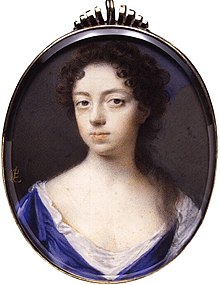A Tale of the Miser and the Poet
Anne Kingsmill Finch 1661 – 1720 (Westminster)
A WIT, transported with Inditing,
Unpay'd, unprais'd, yet ever Writing;
Who, for all Fights and Fav'rite Friends,
Had Poems at his Fingers Ends;
For new Events was still providing;
Yet now desirous to be riding,
He pack'd-up ev'ry Ode and Ditty
And in Vacation left the City;
So rapt with Figures, and Allusions,
With secret Passions, sweet Confusions;
With Sentences from Plays well-known,
And thousand Couplets of his own;
That ev'n the chalky Road look'd gay,
And seem'd to him the Milky Way.
But Fortune, who the Ball is tossing,
And Poets ever will be crossing,
Misled the Steed, which ill he guided,
Where several gloomy Paths divided.
The steepest in Descent he follow'd,
Enclos'd by Rocks, which Time had hollow'd;
Till, he believ'd, alive and booted,
He'd reach'd the Shades by Homer quoted.
But all, that he cou'd there discover,
Was, in a Pit with Thorns grown over,
Old Mammon digging, straining, sweating,
As Bags of Gold he thence was getting;
Who, when reprov'd for such Dejections
By him, who liv'd on high Reflections,
Reply'd; Brave Sir, your Time is ended,
And Poetry no more befriended.
I hid this Coin, when Charles was swaying;
When all was Riot, Masking, Playing;
When witty Beggars were in fashion,
And Learning had o'er-run the Nation,
But, since Mankind is so much wiser,
That none is valued like the Miser,
I draw it hence, and now these Sums
In proper Soil grow up to {1} Plumbs;
Which gather'd once, from that rich Minute
We rule the World, and all that's in it.
But, quoth the Poet,can you raise,
As well as Plumb-trees, Groves of Bays?
Where you, which I wou'd chuse much rather,
May Fruits of Reputation gather?
Will Men of Quality, and Spirit,
Regard you for intrinsick Merit?
And seek you out, before your Betters,
For Conversation, Wit, and Letters?
Fool, quoth the Churl, who knew no Breeding;
Have these been Times for such Proceeding?
Instead of Honour'd, and Rewarded,
Are you not Slighted, or Discarded?
What have you met with, but Disgraces?
Your PRIOR cou'd not keep in Places;
And your VAN-BRUG had found no Quarter,
But for his dabbling in the Morter.
ROWE no Advantages cou'd hit on,
Till Verse he left, to write North-Briton.
PHILIPS, who's by the Shilling known,
Ne'er saw a Shilling of his own.
Meets {2} PHILOMELA, in the Town
Her due Proportion of Renown?
What Pref'rence has ARDELIA seen,
T'expel, tho' she cou'd write the Spleen?
Of Coach, or Tables, can you brag,
Or better Cloaths than Poet RAG?
Do wealthy Kindred, when they meet you,
With Kindness, or Distinction, greet you?
Or have your lately flatter'd Heroes
Enrich'd you like the Roman Maroes?
No–quoth the Man of broken Slumbers:
Yet we have Patrons for our Numbers;
There are Mecænas's among 'em.
Quoth Mammon,pray Sir, do not wrong 'em;
But in your Censures use a Conscience,
Nor charge Great Men with thriftless Nonsense:
Since they, as your own Poets sing,
Now grant no Worth in any thing
But so much Money as 'twill bring.
Then, never more from your Endeavours
Expect Preferment, or less Favours.
But if you'll 'scape Contempt, or worse,
Be sure, put Money in your Purse;
Money! which only can relieve you
When Fame and Friendship will deceive you.
Sir, (quoth the Poet humbly bowing,
And all that he had said allowing)
Behold me and my airy Fancies
Subdu'd, like Giants in Romances.
I here submit to your Discourses;
Which since Experience too enforces,
I, in that solitary Pit,
Your Gold withdrawn, will hide my Wit:
Till Time, which hastily advances,
And gives to all new Turns and Chances,
Again may bring it into use;
Roscommons may again produce;
New Augustean Days revive,
When Wit shall please, and Poets thrive.
Till when, let those converse in private,
Who taste what others don't arrive at;
Yielding that Mammonists surpass us;
And let the Bank out-swell Parnassus.
Font size:
Submitted on May 13, 2011
Modified on March 05, 2023
- 3:28 min read
- 104 Views
Quick analysis:
| Scheme | AABBAACCDDEEAXAAFFGGHHIIAABDFH AAJJIIXBKL MMIIKKNN AAHHBOIIXJEEPPQQAARR XB BNS SXXAAABBTTRR AAXUUULLOOVVWWKXXX |
|---|---|
| Closest metre | Iambic tetrameter |
| Characters | 3,807 |
| Words | 657 |
| Stanzas | 8 |
| Stanza Lengths | 30, 10, 8, 20, 2, 3, 12, 18 |
Translation
Find a translation for this poem in other languages:
Select another language:
- - Select -
- 简体中文 (Chinese - Simplified)
- 繁體中文 (Chinese - Traditional)
- Español (Spanish)
- Esperanto (Esperanto)
- 日本語 (Japanese)
- Português (Portuguese)
- Deutsch (German)
- العربية (Arabic)
- Français (French)
- Русский (Russian)
- ಕನ್ನಡ (Kannada)
- 한국어 (Korean)
- עברית (Hebrew)
- Gaeilge (Irish)
- Українська (Ukrainian)
- اردو (Urdu)
- Magyar (Hungarian)
- मानक हिन्दी (Hindi)
- Indonesia (Indonesian)
- Italiano (Italian)
- தமிழ் (Tamil)
- Türkçe (Turkish)
- తెలుగు (Telugu)
- ภาษาไทย (Thai)
- Tiếng Việt (Vietnamese)
- Čeština (Czech)
- Polski (Polish)
- Bahasa Indonesia (Indonesian)
- Românește (Romanian)
- Nederlands (Dutch)
- Ελληνικά (Greek)
- Latinum (Latin)
- Svenska (Swedish)
- Dansk (Danish)
- Suomi (Finnish)
- فارسی (Persian)
- ייִדיש (Yiddish)
- հայերեն (Armenian)
- Norsk (Norwegian)
- English (English)
Citation
Use the citation below to add this poem to your bibliography:
Style:MLAChicagoAPA
"A Tale of the Miser and the Poet" Poetry.com. STANDS4 LLC, 2024. Web. 26 Apr. 2024. <https://www.poetry.com/poem/3241/a-tale-of-the-miser-and-the-poet>.



Discuss the poem A Tale of the Miser and the Poet with the community...
Report Comment
We're doing our best to make sure our content is useful, accurate and safe.
If by any chance you spot an inappropriate comment while navigating through our website please use this form to let us know, and we'll take care of it shortly.
Attachment
You need to be logged in to favorite.
Log In